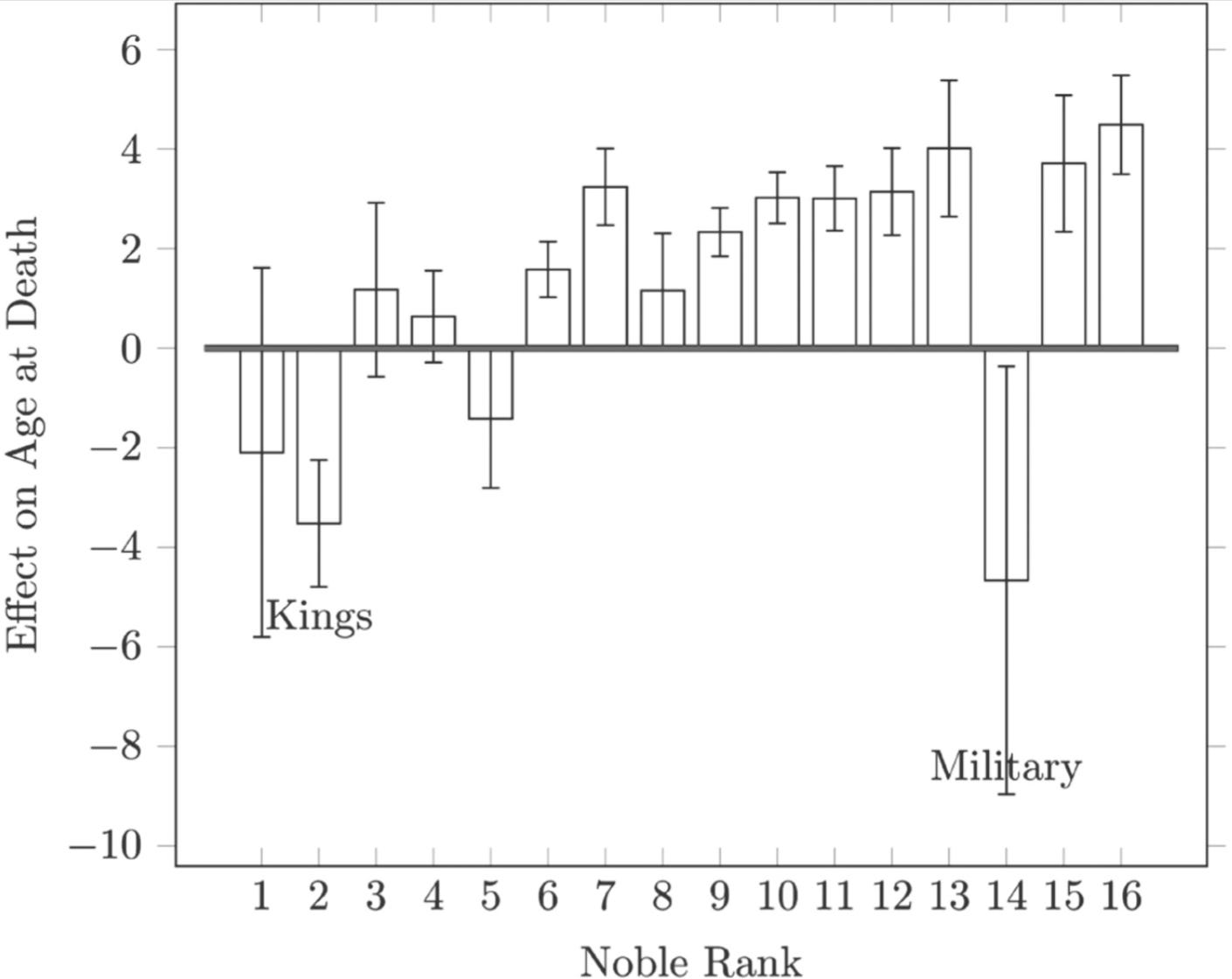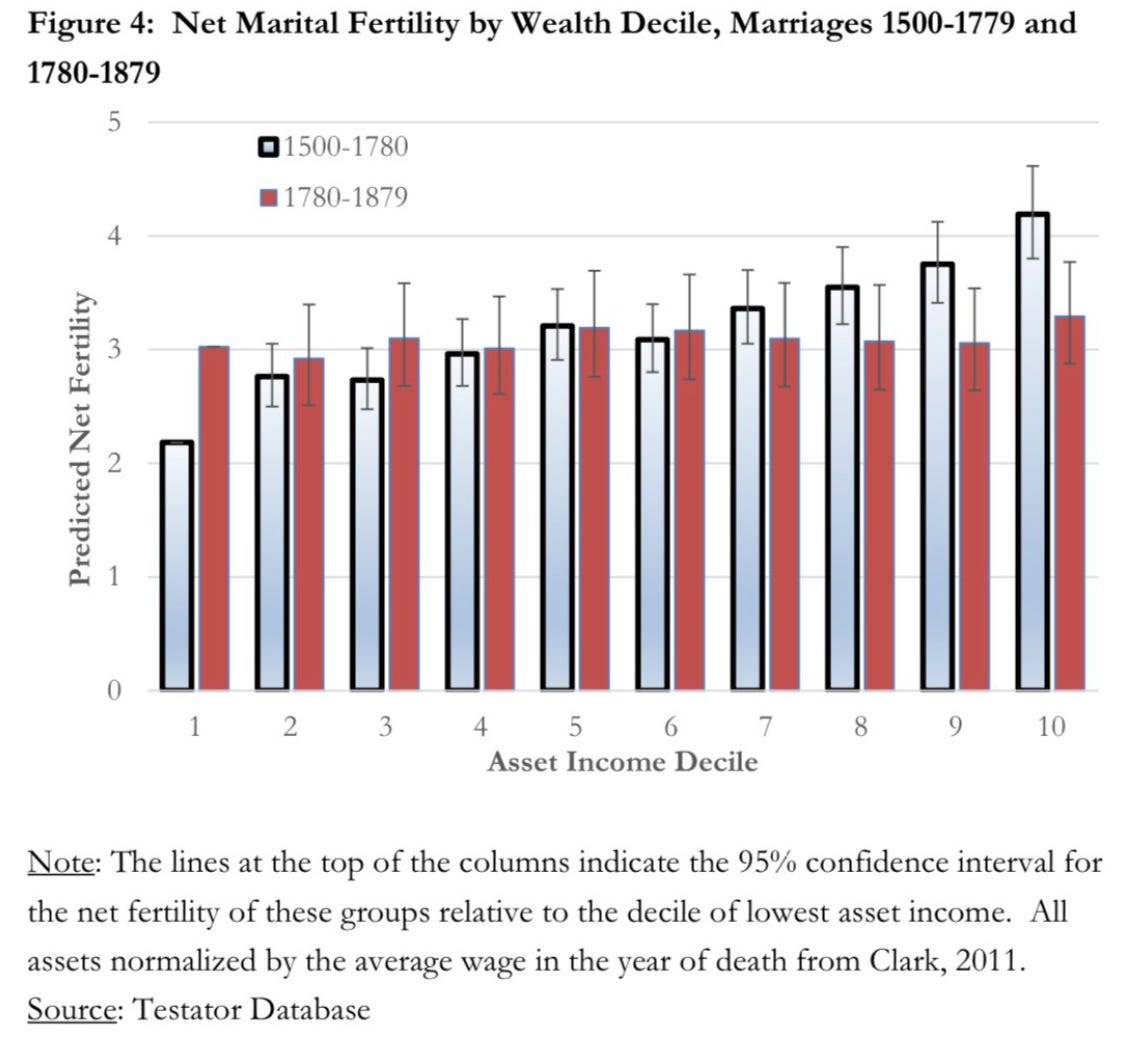Contra Robin Hanson on Kings & Queens theory
In which I cannot resist the urge to debate the K&Q theory
Robin Hanson has recently advanced a theory to explain the fall in fertility we are seeing across the world, particularly in developed countries. I find this theory wildly implausible. The general trend of declining fertility has been widely documented, so I am not going to dwell on it. I have been arguing about it on X a lot, because I cannot resist debating Robin Hanson, so might as well aggregate my arguments in a longer format.
Robin proposes a “Kings and Queens theory” to explain this trend: In short, in the past, a small number of elites had a shot at becoming King. In order to increase their chances of them or their descendants becoming King, they decreased their fertility. The ones that succeeded at becoming Kings by adopting this strategy had outsized reproductive success (think Genghis Khan), so this is how this trait got passed on. In non elite people, this trait is neutral: the propensity to limit family size only gets activated at a certain “eliteness” threshold. In the modern world everyone feels “elite” because we all have a certain level of comfort. So middle class ppl of today will limit their fertility due to an evolutionary mismatch.
I find this theory extremely contrived.
We have much more parsimonious ways to explain the current fall in fertility (that also rely on status, resources etc, but with no threshold effects for a certain elite level). In short, I think humans in general (not just elites), try to maximise status and resources for themselves and their offspring. They also dislike discomfort - and raising kids is massively taxing. Depending on the specific era, culture & customs, adding these variables together will result in different optimal numbers of children for different social classes. In particular, one can easily explain the current lower number of kids among middle classes with this very simple “theory”: kids cost money, they are hard to raise, they do not offer a massive status benefit in a non-religious world & there is a high opportunity cost in terms of both career (status) & resources when it comes to middle class people having kids, specifically. We also have unprecedented access to contraception, so controlling family size has never been easier than before.
So we have much more parsimonious explanations than some imagined threshold effect. To many, this would be enough. But I think the Kings & Queens theory is bad from many more angles. I am going to summarise them here:
Not enough evidence that elites have historically had less kids (and evidence to the contrary exists)
The claim of a universal elite threshold effect is extraordinary and requires extraordinary evidence. But it fails basic empirical tests where we do have data.
Why do I say it is an extraordinary claim? It is a priori unlikely that a sporadic event of becoming king would be enough to consistently lead to selection of a quite complex trait like “limiting fertility when you feel elite” - given that it’s neutral in most of the population. So to compensate for this you would need to see a MASSIVE effect throughout history, where elites had significantly less children than Kings and generally had less kids than the rest of the population. And it’s really unclear this was the case. Indeed, where we do have more reliable data, it seems elites had MORE, not LESS kids. The pattern of elites having less kids seems to be confirmed with certainty only after the Industrial Revolution (which was a massive turning point culturally and technologically). It also doesn’t make sense evolutionarily speaking that on average across eras elites would have had less kids. We know people universally seek high status, so I would expect a general positive relationship between status and reproductive success, subject to cultural constraints and exceptions at some points in history. Why would people even seek higher status if on average it led to worse reproductive outcomes once they became elite? How would a general desire for higher status be selected then? Only to have a shot at becoming elite so that then that elite had a shot at becoming King?
Anyway, let’s turn to the data, where we do have it. In general, data on the exact number of kids elites had is very hard to come by, because of paucity of historical documents. We start to have more accurate records beginning with Early Middle Ages and mostly for Europe. So I am going to focus on that.
Below is a figure from a Gregory Clark paper looking at fertility by wealth decile in England. You can see that before the “demographic transition” of the Industrial Revolution the top decile had more, not less kids.
Now, one could argue top 10% is not fine grained enough. You need to be really in the top 3% or so for this threshold to apply. FINE. Let’s look at that. We have some data on the number of children that married aristocrats had post Renaissance in England. It seems like they had more kids, not less than the general population. One might say that this holds true only for England. But as far as I can tell, this is also true for medieval Florence, France and for Hessian nobles.
For example, this other paper compiles biographical records of Hessian noble families and calculates the average family size. It mirrors the English data very well (if anything the family sizes are even larger), with very high average family sizes in the 17th century - 7.8!!!!! Family size decreases with time, down to 4 post-Industrial Revolution.
To be clear, I am not saying elites never had less kids than the rest of the population. It’s clear that they, like all people, respond to outside incentives. In particular, there was a real concern of balancing inheritance with not risking the dissolution of the family unit. What I am denying is some sort of biological mechanism that evolved specifically to limit fertility when one feels elite.
Indeed, what we are seeing is highly culture dependent fertility patterns. When less kids were wanted, the specific strategies to limit family size also varied (summarised in the quote below). Some involved tweaking the intensive fertility margin (whether one had kids at all), some the extensive margin (how many kids). Others relied on sending younger sons to become clerics or simply having them not marry. In any case, the diversity of strategies & the need to invent laws (e.g. settlements in England) to prevent squandering of the inheritance among many heirs, argues against some “biological drive” with a threshold effect. No need for laws if people already have an instinct to limit fertility when they are elite!
“The solution to this problem varied from country to country, but many nobilities attempted to reduce the severity of the problem by limiting both the number of marriages and the size of families.In French noble families the eldest son generally inherited the bulk of his father’s holdings, but in return he had to pay substantial cash settlements to his brothers and sisters. To prevent too great strain on the family fortune, many nobles placed some of their children in church positions, thereby removing the need to provide them with settlements. A large proportion of the younger sons never married, and when they died, their portions frequently reverted to their families.”
So elites did act to engineer family sizes. Still, they seem to have had more kids than common people during Middle Ages and post-Renaissance, as far as we can tell. How can this be explained? This might be a sampling bias: we hear a lot about how elites limited their family sizes, because they are much more covered in general. But other social classes had good reasons to limit family size, too. Sometimes very pressing ones: for the very poor, there was the very real danger of literally dying of hunger if one had too many kids. We know for example letting kids die of exposure was more common in the past. The middle classes also might have had to limit family size to some extent because they also relied on inheritance!
Another way to convince yourself of this, is to simply read a lot of medieval history to get a glimpse at about how many kids noble usually had. Or if that sounds too boring, look up names in the family tree of Anne Boleyn (a member of the nobility who became Queen in the 16th century). They all had quite a lot of kids. Or you can pick some other noble of the time who would have plausibly had a chance of becoming Queen/King and see how many kids their families had on average (e..g you can pick another of Henry VIII’s noble wives, Jane Seymour and look at her family). This is not true only for English nobles, same thing comes out if you look at French, Austrian etc ones.
Some numbers of kids in Anne’s family:
Anne’s father: 5 kids
Anne’s paternal grandfather: 10 kids
Anne’s paternal great grandfather: not clear
Anne’s maternal grandfather: > 13 kids
Anne’s maternal great grandfather: > 7 kids
Other reasons
There are many other reasons to be skeptical of this theory:
1) Unclear that it’s so much better reproductively to be King, than simply a high status man. And for the theory to work, the difference would have to be massive. I don’t think this holds true specifically. But one would need to carefully check historical differences in fertility between elites and kings. On the other hand, we know that Kings were more likely to die than nobles so it seems they might even have had an evolutionary disadvantage! It might well be that the evolutionarily optimal strategy is to be elite (say Duke), but not quite King.

2) It’s somewhat unclear what the mechanism would be for less kids => higher likelihood to become King or have your descendants become Kings. Dynasties were often quite stable and becoming King was only accessible to people already in the royal family. Arguably, the easiest way for your offspring to be Kings was for your daughter to be married to the King (like Anne Boleyn did). In which case, you wanted more, not less daughters! It’s not like nobles had to invest large amounts of time in raising their kids. High number of kids could be an issue when splitting inheritance, but that seems more of an issue of PRESERVING privilege rather than aiming to be King. Gambling long term for a prize like that (being King), will make you end up losing at some point and turn you bankrupt. To try and win the big prize at such a cost is over centuries very bad risk management.
3) It always seems good for a high status man to have more kids from a purely evolutionary perspective. A man can have a bunch of illegitimate kids and not suffer much consequence for it.
4) It posits a certain meta-rational attitude towards some goal of being king *specifically*. Which is not plausible. And if it were true we should find a lot of evidence for it. To be clear, I think people do want to maximise their status subject to constraints. But it’s not as fine grained as : only elites who can become kings do so.





This is good. Isn’t “net fertility” in the first future though the number of surviving children, not number of births?
Thanks for posting this, I was waiting for this particular critique, which is so obvious I'm not sure Robin Hanson even came up with this hypothesis. To me, the theoretical construct is not solid (in evolutionary and historical terms), so backing it up with data, as Hanania did, doesn't make it any more plausible. At least it showed how constructive discourse works on Substack.